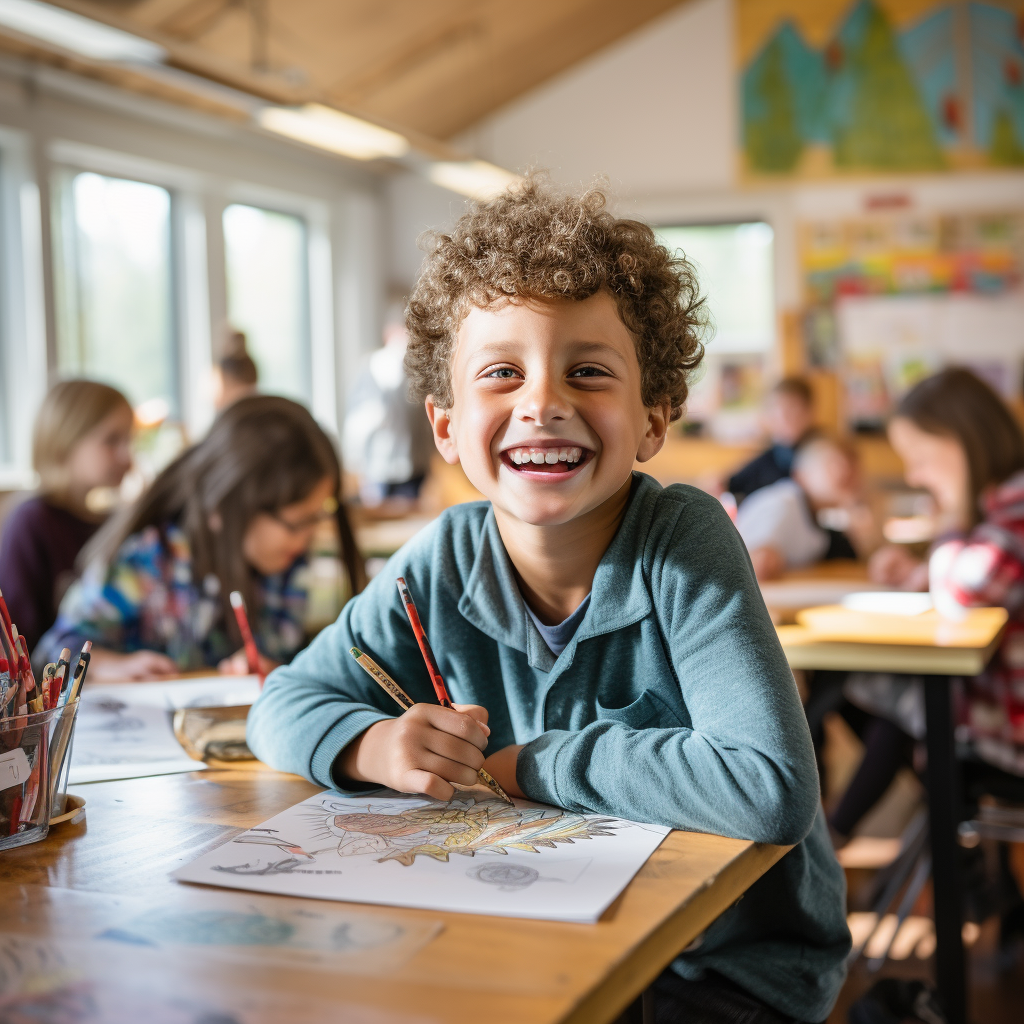Unlock Your Potential: How to Become a Gifted Student!
Developing the mindset of a gifted student involves cultivating a growth-oriented perspective that embraces challenges and recognizes the value of perseverance. Gifted learners often display a deep curiosity and an insatiable desire to delve into complex subjects, which propels them towards academic excellence. To foster this mindset, students need to be encouraged to engage in reflective thinking, to assess their learning strategies, and to consistently set higher goals for themselves.
At Vanguard Gifted Academy, we understand the importance of nurturing this type of intellectual environment. Our personalized learning approach caters to each student's readiness level, ensuring that they are neither under-challenged nor overwhelmed. We believe that by providing a balanced educational experience that integrates STREAM (STEM + Research and Arts) and social-emotional learning, we can promote the self-awareness and confidence necessary for gifted students to thrive.
Parents and educators can support the development of a gifted student mindset by offering opportunities for students to explore their interests in depth, encouraging risk-taking in learning, and teaching them to view setbacks as opportunities for growth. This approach helps to lay a strong foundation for students to become lifelong learners and innovators.
If you're interested in learning more about how we cultivate the gifted student mindset, or if you'd like to witness our unique educational approach in action, email us to schedule a tour. Our team at Vanguard Gifted Academy is eager to guide you through our personalized learning environment designed to unlock each child's potential.
Cultivating a Love for Learning and Curiosity

Instilling a love for learning in gifted students goes beyond the traditional classroom setting. It is about encouraging an environment where curiosity is not just welcomed, but is the driving force behind every educational activity. A gifted student's journey is marked by an unyielding quest for knowledge and understanding, which can be nurtured through exposure to a variety of subjects and disciplines.
In order to cultivate this passion, educators and parents must recognize and support the student's individual interests. This can be achieved through diverse and enriching experiences such as field trips, science experiments, art projects, and literature discussions that challenge their thinking and broaden their perspectives. At Vanguard Gifted Academy, we integrate these experiences into our STREAM curriculum, stimulating students' natural curiosity and fostering a genuine love for learning.
Moreover, by providing gifted students with the autonomy to pursue their own learning paths, we empower them to take ownership of their education. This self-directed approach ensures that students remain engaged and motivated, as they are not just passive recipients of information, but active participants in their learning process.
Through the cultivation of a love for learning and curiosity, gifted students are equipped with the tools to not only excel academically but to also develop into inquisitive thinkers who are capable of driving innovation and progress in their future endeavors.
Strategies for Enhancing Intellectual Abilities

To effectively enhance the intellectual abilities of gifted students, a multifaceted approach is often required. This includes fostering critical thinking skills, encouraging creative problem-solving, and providing opportunities for advanced learning. These strategies are essential components in the educational tapestry of a gifted student's development, allowing them to not only understand complex concepts but to also apply them in various contexts.
One key strategy is to integrate critical thinking exercises into the curriculum, which can take the form of logic puzzles, debate clubs, or analytical writing assignments. These activities compel students to go beyond surface-level understanding and to scrutinize information deeply. By challenging assumptions and considering multiple viewpoints, students sharpen their ability to think critically and make well-reasoned decisions.
Another vital strategy is to encourage creative problem-solving. This can be facilitated through collaborative projects, invention conventions, or the exploration of non-traditional solutions to problems. Gifted students thrive in environments where their creativity is not restrained but is instead used as a tool for innovation and discovery.
Lastly, providing advanced learning opportunities is crucial for gifted students. This may involve differentiated instruction, acceleration programs, or mentorship with experts in their fields of interest. By engaging with material that is both challenging and relevant, gifted students are able to progress at a pace that is commensurate with their capabilities, ensuring that their intellectual potential is maximized.
By employing these strategies, educators and parents can significantly contribute to the intellectual growth of gifted students, preparing them to become the thought leaders and problem-solvers of tomorrow.
The Role of Perseverance in Gifted Education

Perseverance plays a pivotal role in the education of gifted students. Gifted learners often face unique challenges that require not only intellectual ability but also a strong sense of determination and resilience. The capacity to persist through difficulties, setbacks, and the occasional failures is what enables these students to fully realize their potential and achieve their lofty educational goals.
Within the context of gifted education, perseverance is nurtured through the cultivation of a growth mindset. This involves teaching students that their abilities can be developed through dedication and hard work. Educators can reinforce this mindset by offering constructive feedback, setting realistic yet challenging goals, and celebrating the process of learning as much as the outcomes. It is crucial for students to understand that struggle and effort are natural and necessary parts of the learning journey.
Moreover, providing a supportive environment where gifted students can take intellectual risks without fear of undue criticism is essential. When students feel safe to explore and push their boundaries, they are more likely to persist in the face of challenges. This support system can include peer collaboration, where students work together and draw on each other's strengths to overcome obstacles.
Finally, it is important for educators to recognize and address the social-emotional needs of gifted learners. Many gifted students experience heightened sensitivity and intensity, and they may require guidance in managing frustration and stress. Teaching strategies for emotional regulation and resilience can help these students maintain their perseverance when they encounter academic or personal hurdles.
In summary, perseverance is a critical component in the success of gifted learners. Through a supportive educational environment that fosters a growth mindset and addresses the social-emotional aspects of learning, gifted students can develop the tenacity required to navigate the complexities of their educational paths.
Integrating Creative Thinking and Problem-Solving Skills

Integrating creative thinking and problem-solving skills into the curriculum is vital for the development of gifted students. These skills empower them to approach challenges with innovative solutions and to apply their knowledge in diverse and meaningful ways. Gifted learners thrive in environments that stimulate their intellectual curiosity and allow them to explore subjects in depth.
One method of fostering creativity is through project-based learning, where students tackle real-world problems that require them to think critically and devise original strategies. This approach not only enhances their problem-solving abilities but also encourages them to become independent learners who can manage complex projects from conception to completion.
Another strategy is to incorporate open-ended questions and scenarios in the classroom. This encourages students to think beyond standard answers and develop multiple solutions to a single problem. By doing so, they learn to see problems from different angles and to appreciate the value of diverse perspectives in the problem-solving process.
Gifted education should also include opportunities for students to engage with advanced topics that are not typically covered in a standard curriculum. This exposure can ignite a passion for learning and provide a platform for students to apply their creative thinking skills to subjects that truly interest them. Whether it's through independent research projects, mentorship programs, or participation in academic competitions, gifted learners should be given the chance to push the boundaries of traditional learning.
Ultimately, by integrating creative thinking and problem-solving skills into gifted education, we are preparing students not just for academic success, but for a lifetime of innovative and critical thinking. These skills are essential for gifted students to make unique contributions to their fields of interest and to society as a whole.
Building a Support System for Gifted Learners
Creating a robust support system is crucial for the success of gifted learners. This network includes educators, parents, peers, and mentors who understand the unique challenges and needs of gifted children. A strong support system provides emotional, academic, and social reinforcement, allowing gifted students to flourish both inside and outside of the classroom.
At the heart of this support system are dedicated educators who are trained in gifted education. These professionals are equipped to recognize and nurture the potential in each child, providing differentiated instruction that is tailored to the individual learner's strengths and interests. Regular communication between teachers and parents ensures that students' progress is monitored and that their learning plans remain effective and adaptable to their evolving needs.
Peer relationships also play a significant role in the development of gifted learners. Connecting with like-minded individuals can help these students feel understood and valued, which is why group work and collaboration are integral parts of the learning process at Vanguard Gifted Academy. This camaraderie fosters a community where students are encouraged to share their ideas and work together to achieve common goals.
Lastly, mentorship can provide gifted students with guidance and inspiration. Mentors who are experts in their fields can offer insights and opportunities that extend learning beyond the classroom. These relationships can inspire students to pursue their passions and can lead to internships, research projects, and other advanced learning experiences.
For more information or to schedule a tour, email us at gifted@vanguardgiftedacademy.org.
Building a support system for gifted learners is not just about academic achievement; it's about nurturing their overall well-being and helping them to become confident, well-rounded individuals. By providing a network of support, Vanguard Gifted Academy ensures that each student has the resources and encouragement needed to unlock their full potential.
